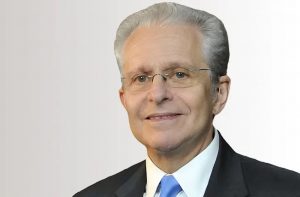Laurence “Larry” Tribe, longtime Harvard Law School professor, has decided to continue to work on cases involving democracy-related issues, LGBTQ rights, and racial injustice alongside matters for corporate clients by joining the five-year-old boutique litigation firm Kaplan Hecker & Fink.
“The one firm that met my criteria in terms of doing good in the world and not creating conflicts with the things I believe in, but also having the highest possible quality, was Kaplan Hecker,” Tribe said of his decision in an interview. He claims he turned down offers from Big Law firms, but declined to name which ones.
Kaplan Hecker was founded by former Paul Weiss partner and Manhattan-based litigator Roberta Kaplan in 2017, who first rose to legal fame by helping to overturn the Defense of Marriage Act in the case United States v. Windsor. Tribe will serve as of counsel at the firm.
The firm is growing rapidly and already has 67 lawyers. It’s gained attention for its mix of public service work and corporate-paying clients, including taking on Donald Trump, representing New York advice columnist E. Jean Carroll in a defamation suit, and bringing claims against Trump on behalf of viewers of the TV show “The Apprentice,” who allege that the former president pushed a sham mid-level marketing scheme in which they invested.
Kaplan Hecker also brought a lawsuit on behalf of those who suffered injuries at the “Unite the Right” rally in Charlottesville, Virginia, against the organizers of the event.
The firm is committed to social justice causes such as LGBTQ rights and racial injustice, but it is also focusing on threats to democracy, according to Roberta Kaplan.
“Today we face arguably a far greater threat, which is the health and survival of our democracy. And helping Larry fight that fight, it’s hard to imagine a better person you’d want fighting alongside you on that issue,” Kaplan said in an interview.
Like his new firm, Tribe has often taken a mix of public and private work, even while he was a professor for more than 50 years. He is currently representing Coca-Cola in a case against the IRS.
“My criteria for the cases I’ve agreed to work on has always been I want to do things that advance the law,” he said. “I may not always agree with the politics I’m representing, but I want to advance justice and the cause of democracy in the process of everything I do.”
Among the 35 cases Tribe has argued in front of the U.S. Supreme Court, in 1985 he successfully defended an opinion in Board of Education of Oklahoma City v. National Gay Task Force, when the court ruled that teachers couldn’t be fired for advocating equality for gays and lesbians.
Tribe says that lawyers’ decisions on whom to represent are these days often reduced to pithy takes on social media, and thus the environment for lawyers is “more fraught” than ever before.
“It’s important that individual lawyers and law firms grow a spine, get a backbone, grow a pair, and stand up for principles they think are right even when it involves representing people who don’t always match their ideological profile,” he said. “Working with lawyers on the other side of the aisle ideologically helps build bridges and fight back against that poisonous atmosphere, and that’s one thing I hope to continue doing.”






















